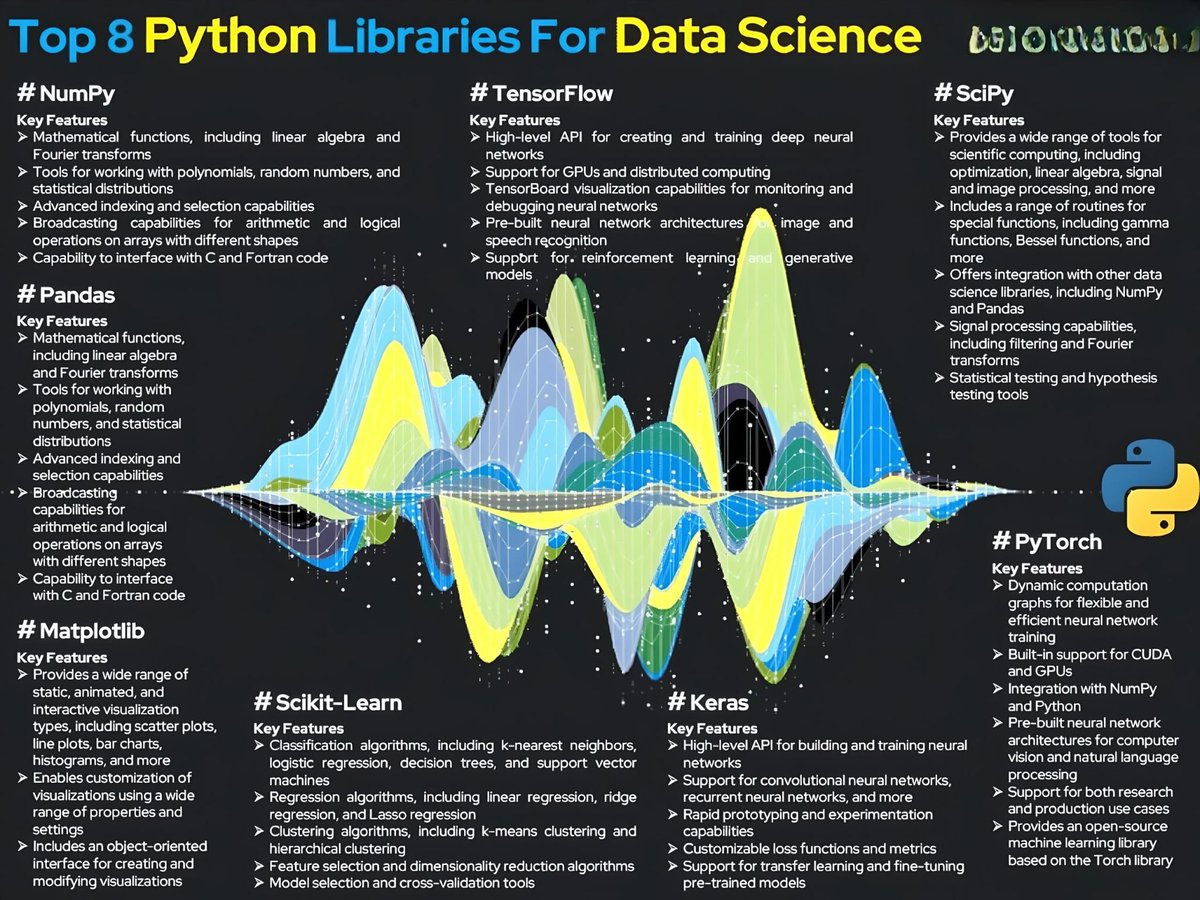𝗧𝗼𝗽 𝟴 𝗣𝘆𝘁𝗵𝗼𝗻 𝗟𝗶𝗯𝗿𝗮𝗿𝗶𝗲𝘀 𝗳𝗼𝗿 𝗗𝗮𝘁𝗮 𝗦𝗰𝗶𝗲𝗻𝗰𝗲 📊 Are you stepping into the world of Data Science or looking to level up your skills? Mastering the right libraries can make all the difference! Here are the top 8 Python libraries that every data professional should know: 1️⃣ 𝐍𝐮𝐦𝐏𝐲 Key Features: • Mathematical functions, including linear algebra and Fourier transforms • Tools for working with polynomials, random numbers, and statistical distributions • Advanced indexing and selection capabilities • Broadcasting for arithmetic and logical operations on arrays • Interfacing with C and Fortran code 2️⃣ 𝐏𝐚𝐧𝐝𝐚𝐬 Key Features: • Data manipulation and analysis • Handling labeled and time series data • Tools for working with structured data • Advanced indexing capabilities • Seamless integration with other libraries 3️⃣ 𝐌𝐚𝐭𝐩𝐥𝐨𝐭𝐥𝐢𝐛 Key Features: • Static, animated, and interactive visualization • Plot types like scatter, line, bar charts, histograms • Customization options for visualizations • Object-oriented interface for creating plots 4️⃣ 𝐒𝐜𝐢𝐤𝐢𝐭-𝐋𝐞𝐚𝐫𝐧 Key Features: • Classification, regression, and clustering algorithms • Dimensionality reduction and feature selection • Model selection and cross-validation • User-friendly API 5️⃣ 𝐓𝐞𝐧𝐬𝐨𝐫𝐅𝐥𝐨𝐰 Key Features: • High-level API for deep neural networks • GPU support for distributed computing • TensorBoard for visualization • Pre-built architectures for image and speech recognition • Reinforcement learning and generative models 6️⃣ 𝐊𝐞𝐫𝐚𝐬 Key Features: • User-friendly API for neural networks • Support for convolutional and recurrent networks • Rapid prototyping and customizable loss functions • Transfer learning and pre-trained models 7️⃣ 𝐒𝐜𝐢𝐏𝐲 Key Features: • Scientific computing tools (optimization, linear algebra, image processing) • Special functions and signal processing • Statistical testing and hypothesis tools • Integration with NumPy and Pandas 8️⃣ 𝐏𝐲𝐓𝐨𝐫𝐜𝐡 Key Features: • Dynamic computation graphs • Built-in support for CUDA and GPUs • Pre-built architectures for vision and NLP • Research and production use • Open-source machine learning library 💡 Learning and mastering these libraries can boost your Data Science career and help you work more efficiently with data, models, and visualizations. 👉 Which library is your favorite, and why? Drop your thoughts in the comments! 👇 #𝐍𝐮𝐦𝐏𝐲 #𝐏𝐚𝐧𝐝𝐚𝐬 #𝐌𝐚𝐭𝐩𝐥𝐨𝐭𝐥𝐢𝐛 #𝐒𝐜𝐢𝐤𝐢𝐭𝐋𝐞𝐚𝐫𝐧 #𝐓𝐞𝐧𝐬𝐨𝐫𝐅𝐥𝐨𝐰 #𝐊𝐞𝐫𝐚𝐬 #𝐒𝐜𝐢𝐏𝐲 #𝐏𝐲𝐓𝐨𝐫𝐜𝐡 #python #datascience #machinelearning #deeplearning #ai #artificialintelligence #programming #developer #softwaredeveloper #computerscience #calculus #linearalgebra #algebra #maths #mathematics
@Python_Dv I've found that mastering the right libraries is crucial in Data Science, but it's also important to remember that tools are just tools - it's the human intuition and creativity that truly drive innovation.


